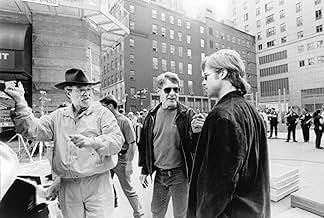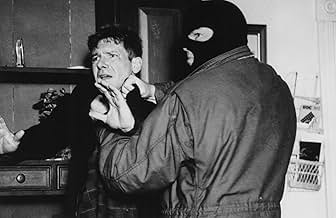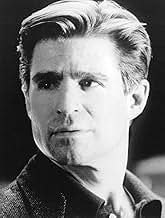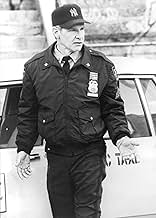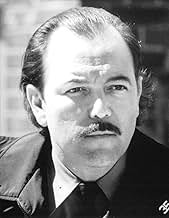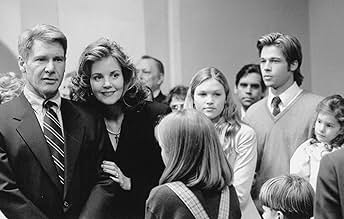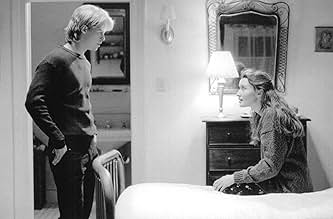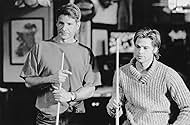Un miembro del IRA escapa a Nueva York y se esconde en la casa de un policía de pleno derecho que desconoce su identidad. El recién llegado se integra a la familia, mientras organiza una gra... Leer todoUn miembro del IRA escapa a Nueva York y se esconde en la casa de un policía de pleno derecho que desconoce su identidad. El recién llegado se integra a la familia, mientras organiza una gran compra de armas para su organización.Un miembro del IRA escapa a Nueva York y se esconde en la casa de un policía de pleno derecho que desconoce su identidad. El recién llegado se integra a la familia, mientras organiza una gran compra de armas para su organización.
- Dirección
- Guionistas
- Elenco
- Premios
- 1 nominación en total
Rubén Blades
- Edwin Diaz
- (as Ruben Blades)
Ashley Acarino
- Morgan O'Meara
- (as Ashley Carin)
Opiniones destacadas
As a child in Ireland, Frankie McGuire (Brad Pitt) sees his dad gunned down for his involvement with the Irish Republican Army (IRA). As an adult, McGuire has followed in his dad's footsteps. When the IRA decides it needs more firepower, they hatch a plan that involves McGuire going to the United States to pick up a shipment of Stinger missiles. Through American IRA contacts, McGuire adopts a false identity and housing is arranged with a non-involved Irish family headed by New York City cop Tom O'Meara (Harrison Ford).
There is an impression that The Devil's Own is an action film. The Internet Movie Database has it listed as "Action/Drama/Thriller". Although there are some action elements in the film, this is really a tragic drama, almost in a classical sense, and it's best to approach the film with only that genre in mind. The plot is fairly complex and the film tends to move slowly--much more slowly than a typical actioner or thriller.
The heart of the story is McGuire's relationship with O'Meara and his family. All of the other material--the IRA stuff, the mob and terrorist stuff, the New York City cop stuff, and so on, are not the focus. Those elements are present to help establish characterization, to build the relationship and understanding between McGuire and O'Meara, and to provide a justification for the developments in the film, and particularly the conclusion, which all have poignant things to say about the decisions that we make and why we make them.
The film largely succeeds if seen from this dramatic perspective. It's not quite a 10, however, as it always seems slightly distanced from the viewer. It's an 8 out of 10 for me.
(This comment was originally posted on January 16, 2005 and ended with the above. The following was added much later after reading through some other user comments:) We should not forget that even though it takes elements from the real world to construct its story, The Devil's Own is NOT intended to be journalistic or a documentary. There is no claim that it is giving an accurate portrayal of political situations, and it's not intended to campaign for one side or another in a real-world political situation. This is fiction, folks, and should be judged _as fiction_. For that, you should forget about what you know of the real world, and assess the story, images and sounds you experience from your television. Does the story work as a self-contained entity? Are the performances good? Is it visually attractive/rewarding? Those are the kinds of things we should be judging.
For me, The Devil's Own succeeded as a drama about relationships, with its poignancy arrived at primarily by making two people from very different worlds, with very different outlooks, learn to see things from different perspectives.
That's great if you're very knowledgeable about Northern Ireland in the real world and if you have strong opinions about terrorism. However, your knowledge and opinions on that stuff have nothing to do with this film.
There is an impression that The Devil's Own is an action film. The Internet Movie Database has it listed as "Action/Drama/Thriller". Although there are some action elements in the film, this is really a tragic drama, almost in a classical sense, and it's best to approach the film with only that genre in mind. The plot is fairly complex and the film tends to move slowly--much more slowly than a typical actioner or thriller.
The heart of the story is McGuire's relationship with O'Meara and his family. All of the other material--the IRA stuff, the mob and terrorist stuff, the New York City cop stuff, and so on, are not the focus. Those elements are present to help establish characterization, to build the relationship and understanding between McGuire and O'Meara, and to provide a justification for the developments in the film, and particularly the conclusion, which all have poignant things to say about the decisions that we make and why we make them.
The film largely succeeds if seen from this dramatic perspective. It's not quite a 10, however, as it always seems slightly distanced from the viewer. It's an 8 out of 10 for me.
(This comment was originally posted on January 16, 2005 and ended with the above. The following was added much later after reading through some other user comments:) We should not forget that even though it takes elements from the real world to construct its story, The Devil's Own is NOT intended to be journalistic or a documentary. There is no claim that it is giving an accurate portrayal of political situations, and it's not intended to campaign for one side or another in a real-world political situation. This is fiction, folks, and should be judged _as fiction_. For that, you should forget about what you know of the real world, and assess the story, images and sounds you experience from your television. Does the story work as a self-contained entity? Are the performances good? Is it visually attractive/rewarding? Those are the kinds of things we should be judging.
For me, The Devil's Own succeeded as a drama about relationships, with its poignancy arrived at primarily by making two people from very different worlds, with very different outlooks, learn to see things from different perspectives.
That's great if you're very knowledgeable about Northern Ireland in the real world and if you have strong opinions about terrorism. However, your knowledge and opinions on that stuff have nothing to do with this film.
I love movies from this timeperiod. They carry a vibe that's gone in modern day movies. Different camera action, less pace (even action movies) and a different psychology of the characters. TDO is not the best movie of it's genre, but Ford and Pitt bring a lot of weight to it. Pitt is charming as always, but is also convincing portraying a ruthless IRA commander. A decent script, lovely irish accents and convincing motives for the characters make this a nice movie for a sunday afternoon.
What is it with American-Irish? Some of their richest and most respectable members have poured millions of Dollars into the IRA, harboured some of their members, idealised the notion of a "fight for freedom". Believe me, as a Scot, with William Wallace et al I've always had a certain affinity for heroes. But the IRA are no heroes. They've become Northern Ireland's drug-dealers, extortioners, gangsters. The people of Ireland as whole have had enough of them and their way of terrorising innocent people. May it be the IRA or the UDP, the notion of a Catholic V Protestant jihad has long ago turned into a simple cycle of self-perpetuating violence. These men and women are no longer anything resembling the oh-so glorious Michael Collins, they are terrorists who don't know when to quit and never knew anything but how to fight. These men aren't the Brad Pitts of the world, nor is the British Army an oppressor anymore (considering that over 90% of the locals support the Army, simply because it provides protection). Yet in 1997 we still got the great toss of this movie, showing us how brave Irishmen fight against an onslaught of British stormtroopers and evil S(I)S men. Somehow it seems that America is hell-bent on keeping up the idea of the stiff upper-lip English villain. May it be The Devil's Own, Braveheart, U-571 or most recently The Patriot, Hollywood seems bent on demonising the US' closest ally, both politically and culturally. I may not be a great fan of the English, but even I know what harm stereotypes can do. Perhaps the writer should have gone out to the streets of Belfast and asked ordinary people what they think of the IRA. Perhaps the writer should have also approached a soldier and asked him what it's like to occupy Northern Ireland. Somehow, I have severe doubts that a movie about the post-WW2 SS-"Werwölfe" guerillas would be quite so romanticised.
And this movie has a Riverdance sequence. Oh please....
And this movie has a Riverdance sequence. Oh please....
I created an account just for this review, due to the low ratings others have given. I mean, it is not the best movie I've seen, but it is not that bad it should be given 1's, 2's, or 3's, etc. It is not an action movie nor a thriller, but there is still some of both in this movie. Yes, 'aye' is a bit overused, but you will get used to it very quickly. I think Brad and Harrison did a fine job here.
In the end I found it enjoyable to watch on a relaxing evening with a glass of whisky. Just 'a movie' to watch without a lot of triggers and explosions or overthinking scenes. I think people should give it a chance and ignore other reviews.
In the end I found it enjoyable to watch on a relaxing evening with a glass of whisky. Just 'a movie' to watch without a lot of triggers and explosions or overthinking scenes. I think people should give it a chance and ignore other reviews.
I say this making no pretense at completely understanding the Irish conflict myself (you'd have to ask someone with experience of Belfast for a more authentic take on the situation), but the irresponsible way the troubles were used here as a backdrop to what is supposed entertainment staggers me. It isn't as if it needed this detail; the terrorist could have been from any unspecified organisation. In the incompetent handling of sensitive issues that the makers really have no idea of, the production team involved in this really have let themselves down. Brad Pitt realised this too late and henceforth disowned the film, a fact which made me admire and respect him even more.
For this I wanted to hate the film, and yet found myself unable to. Beneath the misbegotten attempts at 'political comment', there is a decent little thriller struggling to get out. Pitt is great as the terrorist (dodgy accent aside) and Ford is as reliable as ever in the role of the honest cop. Director Pakula keeps the story moving at all times and stages the action well. Despite all these pluses, I constantly felt uncomfortable at the ways in which the script tried to manipulate my sympathies. While it's not quite enough to make me downgrade the film on an enjoyment level, it loses big points from an ethical perspective. Shame on you Tinseltown.
For this I wanted to hate the film, and yet found myself unable to. Beneath the misbegotten attempts at 'political comment', there is a decent little thriller struggling to get out. Pitt is great as the terrorist (dodgy accent aside) and Ford is as reliable as ever in the role of the honest cop. Director Pakula keeps the story moving at all times and stages the action well. Despite all these pluses, I constantly felt uncomfortable at the ways in which the script tried to manipulate my sympathies. While it's not quite enough to make me downgrade the film on an enjoyment level, it loses big points from an ethical perspective. Shame on you Tinseltown.
¿Sabías que…?
- TriviaBrad Pitt wanted to leave the production, but was threatened by a lawsuit. In the February 2, 1997, issue of Newsweek, Pitt called the film a "disaster", and said that "it was the most irresponsible bit of filmmaking - if you can even call it that - that I've ever seen. I couldn't believe it". Rumors of fighting on the set (especially over which star would be the focus of the film) plagued the production. The original script was discarded and there were at least seven subsequent rewrites. Pitt said the final version was "a mess". "The script that I had loved was gone," he said. "I guess people just had different visions and you can't argue with that. But then I wanted out and the studio head said, 'All right, we'll let you out, but it'll be $63 million for starters." (Harrison Ford later noted that Pitt "forgot for a moment that he was talking to someone whose job it was to write this s*** down".)
- ErroresWhen taking Rory/Frankie in to the police station, Tom and his partner leave him alone, though handcuffed, in the rear seat. It is standard police practice to have one officer in back with the suspect, and seated directly behind the driver. This prevents any assault on the driver, or attempt to escape without being observed - or seen too late by way of the rear view mirror as happened here.
Selecciones populares
Inicia sesión para calificar y agrega a la lista de videos para obtener recomendaciones personalizadas
- How long is The Devil's Own?Con tecnología de Alexa
Detalles
Taquilla
- Presupuesto
- USD 90,000,000 (estimado)
- Total en EE. UU. y Canadá
- USD 42,868,348
- Fin de semana de estreno en EE. UU. y Canadá
- USD 14,274,503
- 30 mar 1997
- Total a nivel mundial
- USD 140,807,547
- Tiempo de ejecución1 hora 51 minutos
- Color
- Mezcla de sonido
- Relación de aspecto
- 2.39 : 1
Contribuir a esta página
Sugiere una edición o agrega el contenido que falta




